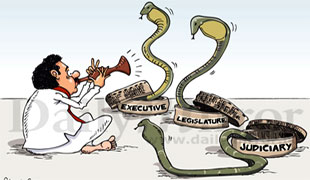Speech in Parliament – 7th December 2012
“…The other issue is also one of great concern to us, that of military rule. The Hon. Member was heard to talk of the Rule of Law. We don’t want military rule in any part of the country. Be it LTTE rule or even Sri Lankan Army rule. We want civilian rule….we don’t want the Army rule, but there is a military rule that is being imposed upon our people and that is to be avoided. It is true that during the time that the war was on there were certain necessities, but now it is 3 ½ years later…enough time to have changed the situation. It is not necessary to continue in that high-handed fashion. We are not going to achieve any reconciliation if it goes on like this.
Coming to the Rule of Law, I want to read A.V. Dicey, ‘The Law of the Constitution’. These books are available in the library…those of you who can read, can read these things! And for your benefit I’ll read certain portions, enough for you to be able to digest for the day. And this is what it says – the principle of the rule of law:
‘The supremacy of the law of the land was not a novel doctrine in the 19th century. It may be traced back to the medieval notion that law, whether it be law ordained by God or by man, ought to rule the world.’
That is the Rule of Law and that is why our own Constitution also has very specifically, even in the preamble, talked about the Rule of Law. It says, that is a fundamental principle – the Rule of Law. It’s on that bedrock that our democracy exists.
Several mentions have been made in this House in the last couple of weeks with regard to sovereignty of the people. In our Constitution the people are sovereign. It is not the Parliament that is sovereign. It is the people who are sovereign. This is different to the British concept…it is a British concept that the Parliament is sovereign. In fact, A.V. Dicey says that in Britain, Parliament means three things; the King, the House of Lords and the House of Commons. All these three things, together, is called the Parliament and the essence of the supremacy or the sovereignty of Parliament is that Parliament can make any law whatever and Parliament can unmake law and that is what we call the legislative supremacy of Parliament.
In this country also we have the legislative supremacy of parliament…there is no supremacy of Parliament. That’s a wrong notion. Not even in England, now. Hundred years ago that concept went out. In the 8th edition of A.V. Dicey, that was in 1855, he talked about the sovereignty of Parliament but in 1911, after the Parliament Act in the UK, in the 1914 edition, before he died, at the age of 92, he retraced it and said that the concept of Parliamentary sovereignty was outdated, and that was in 1911…hundred years ago in England. The situation had changed. But in Sri Lanka, in the 1972 Constitution, we did have the notion of Parliamentary supremacy or the legislative supremacy of Parliament. In the 1978 Constitution, for the first time, the issue of referendum was introduced.
In our Constitution we have two concepts: one is the rule of law and the other is separation of powers and as Parliament is supreme in the legislative sphere, the Jurdiciary is supreme in another sphere. Even in England, the concept of legislative supremacy came about through interpretation of Courts. In our Constitution, in Article 125 it has been very clearly laid out that it is only the Judiciary, and that too only the apex court, the Supreme Court, that has the sole and exclusive jurisdiction to interpret the Constitution.
When the concept of referendum was brought in the 1978 Constitution – it wasn’t there in 1972 Constitution – why was that brought in? It was brought in because the powers of Parliament were limited. Even by 2/3 majority you can’t change certain things in the Constitution. You can change it only by additionally going directly to the people and getting their consent at a referendum. That is why we have these entrenched clauses in the Constitution. The point that I’m making is that in the 1st Republican Constitution you could make any law. You didn’t have to get the consent of the people at a referendum. But now, under the 2nd Republican Constitution that we live under, the power of the Parliament has been restricted because you can’t change or you can’t make laws contrary to certain entrenched provisions. You have to go directly to the people because the people are sovereign, not Parliament. People have delegated their sovereignty to be exercised by three modes of governance and one has been given to Parliament, the other has been given to the President…the President has also been elected directly by the people but that does not mean that the Executive is supreme. Parliament is elected by the people, President is directly elected by the people…you can’t say Parliament is supreme over the other two institutions, merely because the Parliament is elected by the people. These are three parallel institutions that operate under a concept of separation of powers and unless we function in that way, the whole system will collapse. Thank you very much.”
